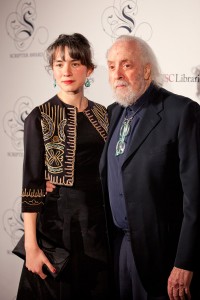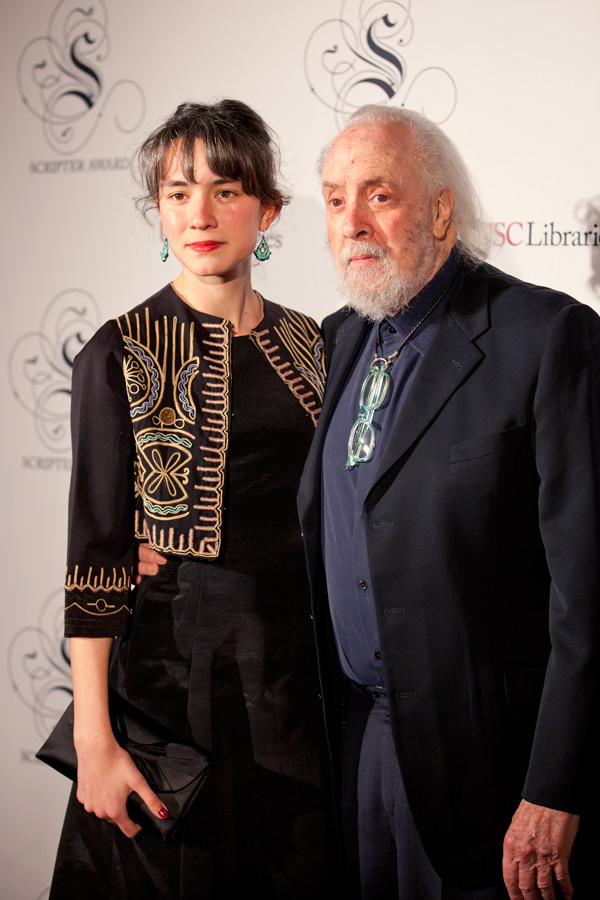USC hosts 26th annual Scripter Award
USC hosted the 26th annual USC Libraries Scripter Award Saturday at Doheny Memorial Library.

Red carpet · Robert Towne (right) attended the USC Libraries Scripter Award with his daughter, Chiara (left). – Ralf Cheung | Daily Trojan
The Scripter Award, founded in 1988, is bestowed by the Friends of the USC Libraries and honors the authors and screenwriters of the year’s motion pictures that were adapted from a printed work. The nominees for this year’s Scripter Award were the authors and screenwriters of 12 Years A Slave, Captain Phillips (from the book A Captain’s Duty: Somali Pirates, Navy SEALs, and Dangerous Days at Sea), Philomena (adapted from The Lost Child of Philomena Lee), The Spectacular Now and What Maisie Knew.
This year’s Scripter Award ceremony, which included a silent auction and three-course meal, focused on raising donations for the renovations of Leavey Library. Catherine Quinlan, dean of USC Libraries, said that libraries are necessary to the intellectual and creative life of students.
“The stories of the writers, artists and thinkers themselves — the detail of their lives, of their developments and observances — speak to the audience of young scholars and artists for inspiration, guidance and models to follow,” Quinlan said.
Jack Epps, member of the selection committee and associate professor at the USC School of Cinematic Arts, said that it’s wonderful to see the spotlight on screenwriters, which doesn’t happen very often.
“It’s also a wonderful marriage of books and films,” Epps said. “The two mediums are put together so well and drive you to each other. A great movie drives you to the novel, and a great novel drives you to the movie.”
Professor Epps also explained the nomination process of the Scripter Award.
“You’re really looking for a great initial source of work and how that initial source then translates into the screen,” he said. “A lot of that is character development, a telling narrative and involving you — you know, does it raise your heartbeat.”
After much anticipation, author Solomon Northup and screenwriter John Ridley were honored with the 26th annual Scripter Award for 12 Years A Slave. Northup’s relatives accepted the award on his behalf.
In his emotional acceptance speech, Ridley spoke of a special relationship between the writer and the originator and how Solomon Northup’s writing in particular has affected him.
“There was a question asked earlier, whether we needed books and libraries, and I can say I certainly did,” Ridley said. “Before this I didn’t know who Solomon Northup was and I didn’t know his story … Solomon, the clarity that he wrote [with], the provocative language he used and, more importantly, the strength of his character to go through what he went through without bitterness and without hate, that really taught me something.”
The Friends of USC Libraries also presented the Literary Achievement Award to Robert Towne for his incredible work in screenwriting. Some of Towne’s screenwriting credits include Mission: Impossible, Mission: Impossible II and Chinatown, for which he won the Academy Award for Best Writing, Original Screenplay.
Howard Rodman, co-chair of the selection committee and School of Cinematic Arts professor, explained that adaptations to film can be difficult.
“[An adaptation] can betray the book, but it can also bring it to life for audiences far larger than ones that frequent bookstores or libraries,” Rodman said. “The great adaptation will complete the circle, bringing us back to the book: make the introduction, then gently close the door from the outside to leave the two of them alone.”
Rodman continued, speaking highly of all of the nominated screenwriters for their success and talents shown in their adapted works.
“I thought that Billy Ray did astonishingly good work in adapting Captain Phillips,” Rodman said.
Ray spoke on how he transitioned written work onto the screen.
“The source material was so good, the story was so good; I just tried not to get in its way,” he said.
Glenn Sonnenberg, co-founder of the USC Scripter Award and the president of the board of Friends of the USC Libraries, said that the founders of the USC Libraries Scripter Award were thinking about how different media can cross boundaries. He emphasized that art can be applied across different media outlets with adaptations that build on the written work’s great initial idea.
“The films we are honoring today defy the adage, ‘Never judge a book by its movie,’” Sonnenberg said.

